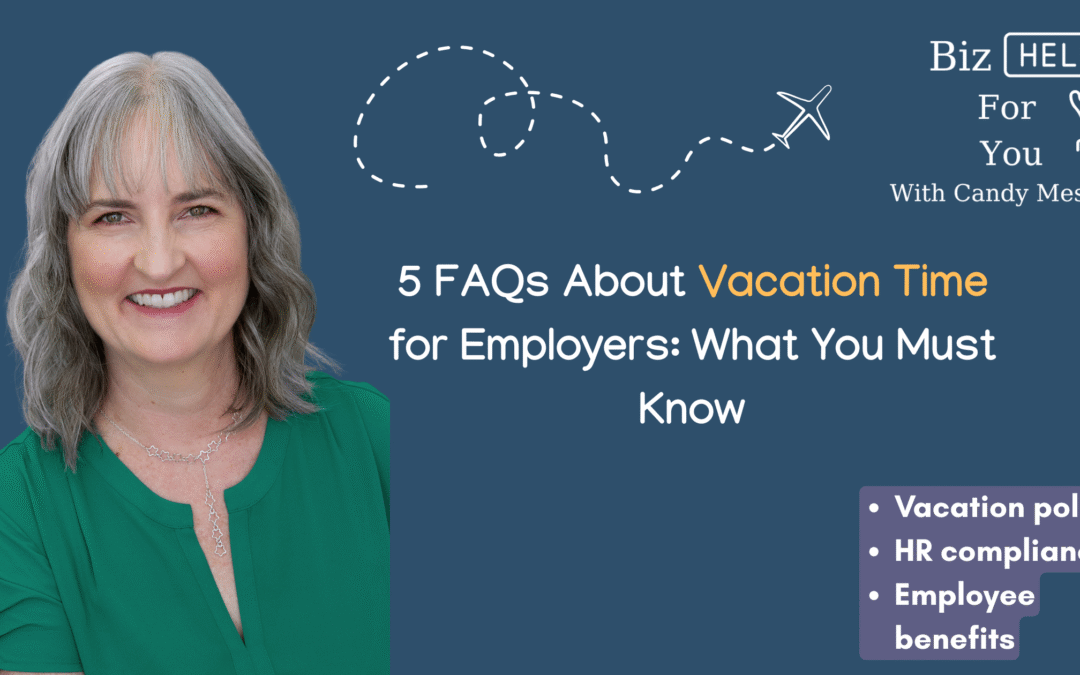Today, we’re diving into one of the most common HR topics I hear from business owners: vacation pay and policies. Here are five frequently asked questions and what you need to know to handle them effectively.
1. Is Vacation Pay Required by Law?
In most cases, no-vacation pay is not mandatory under federal law. Unless an employment contract or collective bargaining agreement requires it, employers are not legally obligated to offer paid or unpaid vacation.
That said, several states do have laws requiring employers to pay out unused, accrued vacation time when an employee leaves. These laws don’t require you to offer vacation time—they just regulate what happens if you do.
Many businesses choose to offer vacation as a benefit to boost morale, support retention, and reduce burnout. If budget constraints make it difficult to provide this benefit, or you simply choose not to, that’s legally acceptable in many areas, as long as you’re not contractually bound to offer it.
2. Can I Have a “Use It or Lose It” Policy?
While a “use it or lose it” policy might encourage employees to take their time off, it’s not always legal. In some states, earned vacation time is considered a form of compensation. That means if an employee doesn’t use it, you can’t take it away—and if they leave the company, they must be paid for any unused time.
If your state prohibits “use it or lose it” policies, consider implementing an accrual cap instead. This means employees can only accumulate up to a certain amount of vacation time, helping you manage balances without risking legal issues.
3. Can I Set Blackout Dates for Vacation?
Yes, you can designate blackout periods when taking vacation isn’t allowed, especially if your business has busy seasons where full staffing is critical. You can also limit how many employees can be off at the same time.
The key here is communication. Make sure your blackout dates and scheduling rules are clearly stated in your employee handbook or policies. Surprises can lead to frustration and disengagement, so be proactive about setting expectations.
4. Do I Have to Offer Vacation to All Employees?
No, vacation time doesn’t have to be universal. You can tailor your vacation policy to fit different roles or employee classifications, as long as it’s applied fairly and without discrimination.
For example, you might:
- Offer vacation only to full-time employees
- Provide prorated vacation for part-time staff
- Require a minimum length of service before vacation can be used
- Offer additional vacation time to senior-level staff or as a negotiation tool during hiring
Whatever you decide, consistency and clarity are crucial. Put your policy in writing and ensure all employees understand it.
5. What’s the Best Way to Avoid Conflict Over Vacation Policies?
Clear communication and documented policies are your best defenses against misunderstandings or internal tension. Make sure your vacation policy is written, accessible, and consistently applied.
Employees are more likely to respect and appreciate your rules if they know what to expect—and if those rules are applied fairly across the board.
Offering vacation benefits can be a powerful tool for employee satisfaction and retention, but only if managed wisely. Keep your policies legal, logical, and transparent, and you’ll build a foundation that supports both your business and your team.
Need help refining your employee policies? Reach out for support tailored to your unique business!
